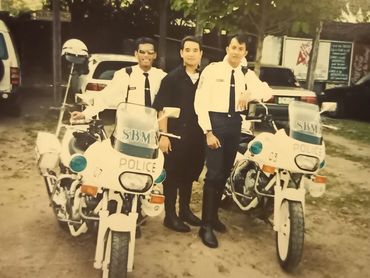We teach what most companies won't teach.
Diverse Tactical training techniques
A disaster can happen anytime. We thrive to make a difference by providing Training for Law Enforcement and Search & Rescue Teams. With over 30 Years of Rescue experience we know and understand the need of Training.
Our instructor have a minimal Class 3 license. All whom have prior Law Enforcement Instructor Training.
ZARc OC instructor / end user TRaining apac region
OC Law Enforcement Scenario Training
OC Law Enforcement Scenario Training

Chaen Tidsuchon is a Certified ZARC Instructor for the APAC Region. providing comprehensive training for agencies within the APAC region. We are exclusively training with ZARC products within the APAC region
Riot Control OC Spray Training
OC Law Enforcement Scenario Training

We Understand that Riots and protests can be dangerous, Chaen Tidsuchon provides agencies with rigid ZARC OC training within the APAC area to cater to the needs of that country.
Public Safety OC Spray Training

Public Safety is our main focus. If you're looking to provide your agency with reliability and tactical training, Chaen Tidschon provides on-site training to all agencies within the APAC region. Working with your agency, we produce the most efficient techniques and understanding of OC spraying. Officer Safety is our priority.
Certified Instructor Training

Chaen Tidsuchon is certified from ZARC and conducts ZARC OC Training in the APAC Region. We Train Instructors to teach end users, allowing agencies around the globe to deploy more effectively. We help you ensure that all officers are qualified for understanding, handling, and aftercare when dealing with OC Spraying. Our course gives officer the true feeling and fast pace world we live in. Our courses are taught in Mock cities with real scenarios making the officer more confident on how to handle situations more efficiently.
Accessories for ZARC OC
Accessories for ZARC OC

We are prepared to help your agency choose the best accessories for duty officers. Our commitment is determined to your officers more prepared for duty.
Law Enforcement & S.A.R. Training





Incident Command training
DMAT ICS Training
Disasters cause an acute deterioration in all stages of life. An area affected by the disaster in which the normal activities of life are disrupted is described as a “Field” in disaster terminology. Although it is not easy to define the borders of this zone, the area where there is normally functioning society is accepted as the boundary. Disaster management is the responsibility of the local government. However, in many large disaster responses many non-governmental and international organizations play a role. A Disaster Medical Assistance Team is a trained, mobile, self-contained, self-sufficient, multidisciplinary medical and Rescue team that can act in the acute phase of a sudden-onset disaster (48 to 72 hours after its occurrence) to provide medical treatment and Rescue in the affected area. The DMAT medical team can include physicians, nurses, paramedics and EMTS, technicians, personnel to manage logistics, security and others. Various models of Disaster Medical Assistance Teams can be observed around the world.
Preparation for the field response is in essence a risk management process and it should begin with risk analysis. High-risk emergencies and disasters and the health effects that will be caused by these events should be determined beforehand. DMAT Thailand teaches these technics that will be used to create a solid database to determine the steps that should be taken.
The Incident Command System (ICS), was first established in the 1970s in the U.S., for firefighters in the forest service and later adapted for all disaster and emergency situations, provides tenants of response organization. ICS consists of effective command and control, safety, information processing and public information, liaison and operation elements. Many intervention consisting of health concerns include planning, logistics and finance. Within DMAT Thailand we teach a system that is based on the principle that, a single command, a single action manager, a single unit manager and a single individual for a single job must exist with a limited and manageable scope of control. Thus providing a leaders role to have a fully functional ICS leadership.
Chaen Tiduschon's DMAT in Thailand teaches mains objective of health services in disasters is to save lives and maintain the health of the community. A continuous service flow should be created beginning from the disaster scene to final treatment centers. In the early phase after a large disaster there is often a shortage of both search and rescue activities and medical services. DMAT Thailand recognizes difficulties that can be mitigated by creating teaching modules for mobile medical units outside the disaster zone, equipped with rapid response capabilities and combining basic search-rescue skills with effective emergency medical services. These units are generally known as Disaster Medical Assistance Teams (DMAT)

This website uses cookies.
We use cookies to analyze website traffic and optimize your website experience. By accepting our use of cookies, your data will be aggregated with all other user data.